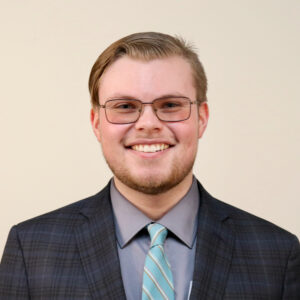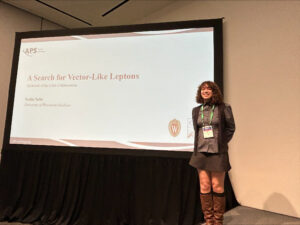Elias Mettner and Nadia Talbi, both conducting research in high energy physics at UW–Madison, won undergraduate presenter awards at the American Physical Society’s April Meeting.
The meeting, held in Sacramento April 3-6, included seven undergraduate oral presentation sessions with six to eight students in each session. The top two students from each session earned “Top Presenter” awards. Mettner and Talbi were the only two UW–Madison students who gave oral presentations, and both won awards.

Mettner is a physics major working with scientist Abdollah Mohammadi. His talk was titled “Pair Production and Hadron Photoproduction Backgrounds at the Cool Copper Collider.”
The Cool Copper Collider is a proposed electron-positron collider that will help scientists to explore the Higgs boson even further. The electron-positron beam will have some natural decay that converts into particles and is recorded by the detector. Mettner’s research asks how this beam background will impact the detector.
“The detector will record this background, and it could take the place of the data we want or make it harder to reconstruct data,” Mettner says. “It’s important to make sure that the backgrounds that will come into the detector using this new design will not cause any issues, otherwise the benefits of this collider design cannot be put to their maximum use.”
Mettner had been interested in physics from a young age and comes from a family of teachers who encouraged him to explore his academic interests. Upon entering UW–Madison, he jumped at the chance to conduct research in particle physics. He joined the UW CMS Collaboration in his freshman year through the Undergraduate Research Scholars program and began his project with the Cool Copper Collider soon after. He was also awarded the Sophomore Research Fellowship for his junior year and the Hilldale Research Fellowship for his upcoming senior year.

Talbi is an astronomy-physics major working in physics professor Tulika Bose’s group and mentored by postdoc Charis Koraka. Her talk, “A Search for Vector-Like Leptons: Compact Analysis,” covered work she has done through a Thaxton Fellowship.
“Bosons are force particles, and basically every boson except for the Higgs — the photon, the gluon — is a vector boson. Leptons are electrons, muons, neutrinos, stuff like that,” Talbi explains. “Vector-like leptons are a hypothetical particle, we don’t know whether or not they exist.”
Talbi was drawn to astronomy because she has long had an interest in the fundamental nature of the universe. As a child, she read an article on Dark Matter and, later, a friend gave her a book on the Standard Model. She was hooked. When she applied for the Thaxton Fellowship, a departmental program that was started to provide more equitable access to undergraduate research in physics, she discussed her interest in particle physics and the research at CERN, which landed her in Bose’s group.
“So before I even had any formal education in physics, where things can be very black and white, I’ve had the opportunity to understand the beautiful things within the field,” Talbi says. “Studying physics, I think, gives you some of the most fundamental understanding of our existence.”
Both Metter and Talbi say that attending conference was overall a very worthwhile experience — even if they both had to take an E+M exam remotely before presenting. (“It was a good bonding experience,” Talbi says.)
“The conference was a lot of fun, and worth it to go and make some connections and experience a bunch of really interesting research from people all in different stages of their careers,” Mettner says.
Adds Talbi: “There were so many undergraduates there, I met so many, I made a lot of friends. It felt like there was a community.”
Both students were also invited to present their award-winning talks to the Physics Board of Visitors spring meeting.